 Petzlover
Petzlover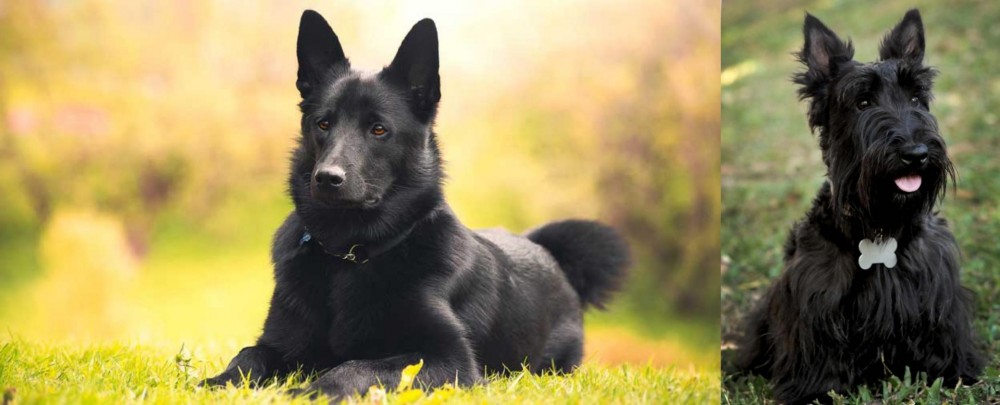 Black Norwegian Elkhound is originated from Norway but Scoland Terrier is originated from United Kingdom. Black Norwegian Elkhound may grow 22 cm / 9 inches higher than Scoland Terrier. Black Norwegian Elkhound may weigh 10 kg / 23 pounds more than Scoland Terrier. Both Black Norwegian Elkhound and Scoland Terrier has almost same life span. Both Black Norwegian Elkhound and Scoland Terrier has almost same litter size. Black Norwegian Elkhound requires Low Maintenance. But Scoland Terrier requires High Maintenance
Black Norwegian Elkhound is originated from Norway but Scoland Terrier is originated from United Kingdom. Black Norwegian Elkhound may grow 22 cm / 9 inches higher than Scoland Terrier. Black Norwegian Elkhound may weigh 10 kg / 23 pounds more than Scoland Terrier. Both Black Norwegian Elkhound and Scoland Terrier has almost same life span. Both Black Norwegian Elkhound and Scoland Terrier has almost same litter size. Black Norwegian Elkhound requires Low Maintenance. But Scoland Terrier requires High Maintenance
 The Black Norwegian Elkhound was first bred in Norway in the early part of the 19th century as a smaller version of the Grey Norwegian Elkhound. The Black version is a Spitz and is very seldom seen anywhere in world but Norway. He is designed for the same job that the Grey Norwegian Elkhound performed. The difference is that the Black Norwegian is smaller, easier to see in the snow and ice of Norway and smaller than the Grey. It is a hunter, a herder, a guard dog and a watch dog. Because of the temperatures in Norway it was very important to have a hunting dog that was able to deal with the cold, the snow and the heavy fall rains in Norway and Scandinavia. The Black Norwegian Elkhound is a powerful and prideful dog. Much more so than the grey, he is independent and strongminded. It is highly intelligent and is one of the most ancient of breeds. He is more durable and more quarrelsome than his cousin the Grey Norwegian Elkhound or the more familiar Swedish Elkhound.
The Black Norwegian Elkhound was first bred in Norway in the early part of the 19th century as a smaller version of the Grey Norwegian Elkhound. The Black version is a Spitz and is very seldom seen anywhere in world but Norway. He is designed for the same job that the Grey Norwegian Elkhound performed. The difference is that the Black Norwegian is smaller, easier to see in the snow and ice of Norway and smaller than the Grey. It is a hunter, a herder, a guard dog and a watch dog. Because of the temperatures in Norway it was very important to have a hunting dog that was able to deal with the cold, the snow and the heavy fall rains in Norway and Scandinavia. The Black Norwegian Elkhound is a powerful and prideful dog. Much more so than the grey, he is independent and strongminded. It is highly intelligent and is one of the most ancient of breeds. He is more durable and more quarrelsome than his cousin the Grey Norwegian Elkhound or the more familiar Swedish Elkhound.
Ancestors of the Black date back to the first days human kind went hunting around 4000-5000BC. There have been skeletons of dogs very much like the Black Norwegian Elkhound found that dated back to that time period. They hunted and guarded for the Vikings and pulled sleds as well. They hunted deer, moose, badger, elk, mountain lions, bears, wolves, lynx, rabbit and reindeer. They are trackers who hold their quarry at bay by barking until the hunter can find them. Today they serve as loved family pets and guard dogs. In a National Emergency the leader of Norway can call up all the privately-owned elkhounds of any kind and assign them to work in a variety of sledding duties. Within the FCI, the Black Norwegian Elkhound is classified as a primitive Nordic hunting dog.
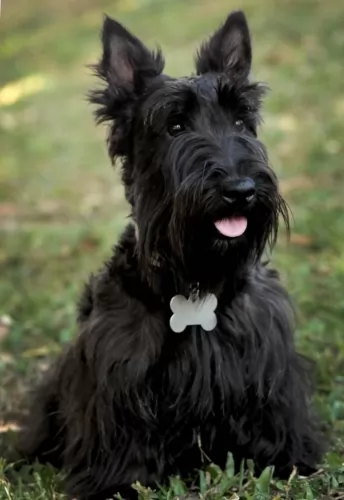 Not much is known about the Scoland Terrier. It is not a purebred but rather a crossbreed developed by crossing the Scottish Terrier with the Westland Terrier. To understand these mixed breeds, look to the original breeds for any combination of the characteristics of the breeds. The offspring of this crossing is not a 50-50 split of the original breeds looks or temperament.
Not much is known about the Scoland Terrier. It is not a purebred but rather a crossbreed developed by crossing the Scottish Terrier with the Westland Terrier. To understand these mixed breeds, look to the original breeds for any combination of the characteristics of the breeds. The offspring of this crossing is not a 50-50 split of the original breeds looks or temperament.
Because the Scoland Terrier is a mix between the Scottie and the Westie he has all the characteristics of a typical terrier perhaps even twice as much. With both parents being terriers, you can expect your Scoland to act like a short legged terrier. These dogs are known for their courage and tenacity. Today these terriers are family companions. Most terriers today come from a pool of ancestral dog in the 19th century in Europe. This information was gleaned from a genetic analysis done in 2006.
The Scoland Terrier, being a hybrid, is not acknowledged by the American Kennel Club (AKC) or the United Kennel Club (UKC). It is acknowledged by the International Designer Canine Registry (IDCR), American Canine Hybrid Club (ACHC), Dog Registry of America, Inc. (DRA), Designer Dogs Kennel Club (DDKC) and Designer Breed Registry (DBR).
 The Black Norwegian Elkhound is a short compact Spitz with dark eyes and a curly tail. It is the coat that sets this dog apart. It is an all-weather coat suitable for the cold, the snow and the rain of Norway. Ears are pointed and erect while the head is wedged and broad. His head is almost like that of a wolf. Its body is strong and compact. Its coat is coarse, short and double. He has a broad black nose with a straight bridge and with black lips and dark brown oval eyes. His legs and withers are strong boned and powerful with well padded feet to protect it from the freezing temperatures of Scandinavia.
The Black Norwegian Elkhound is a short compact Spitz with dark eyes and a curly tail. It is the coat that sets this dog apart. It is an all-weather coat suitable for the cold, the snow and the rain of Norway. Ears are pointed and erect while the head is wedged and broad. His head is almost like that of a wolf. Its body is strong and compact. Its coat is coarse, short and double. He has a broad black nose with a straight bridge and with black lips and dark brown oval eyes. His legs and withers are strong boned and powerful with well padded feet to protect it from the freezing temperatures of Scandinavia.
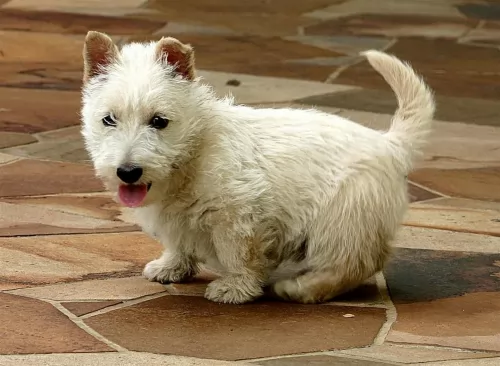 Being a hybrid, the Scoland Terrier will not always look alike and could look like a Scottie, a Westie or a combination of the two. Most breeders of this designer dog say it usually has a body like the Scottie and a round head like the Westie. They are more often black with white markings, but they can often be wheaten as well. With round dark eyes, a scissors bite and black nose, her face is unique. The breed has erect and small, triangular ears and a medium fluffy tale. The coat is hard and wiry, with a dense soft undercoat.
Being a hybrid, the Scoland Terrier will not always look alike and could look like a Scottie, a Westie or a combination of the two. Most breeders of this designer dog say it usually has a body like the Scottie and a round head like the Westie. They are more often black with white markings, but they can often be wheaten as well. With round dark eyes, a scissors bite and black nose, her face is unique. The breed has erect and small, triangular ears and a medium fluffy tale. The coat is hard and wiry, with a dense soft undercoat.
 This dog was made for families. He loves children and is not a one person dogs. He gets attached to everyone in the family. However, he is smart and stubborn. He loves to join in with whatever the family is doing but he does it to please himself not his owner. He loves, loves, loves to play and has the stamina to do so all day long. He is agile, bold, independent, strong, curious and loyal. His loyalty can be territorial, and he can become protective of his home and his family. This makes him an excellent watchdog until your friends come to visit and he won’t let them in the house. You need a high fence to keep him safe in your own yard and away from strangers and even guests till he gets to know them.He tends to be dominant and aggressive with other dogs. They also have strong hunting instincts.
This dog was made for families. He loves children and is not a one person dogs. He gets attached to everyone in the family. However, he is smart and stubborn. He loves to join in with whatever the family is doing but he does it to please himself not his owner. He loves, loves, loves to play and has the stamina to do so all day long. He is agile, bold, independent, strong, curious and loyal. His loyalty can be territorial, and he can become protective of his home and his family. This makes him an excellent watchdog until your friends come to visit and he won’t let them in the house. You need a high fence to keep him safe in your own yard and away from strangers and even guests till he gets to know them.He tends to be dominant and aggressive with other dogs. They also have strong hunting instincts.
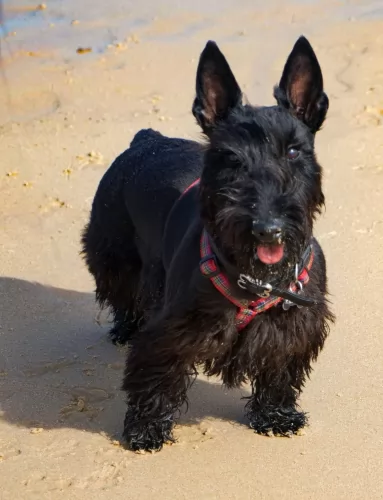 1.Children friendliness - they can be very good with children and children can help them get their exercise.
1.Children friendliness - they can be very good with children and children can help them get their exercise.
3.Adaptability - yes but she is adept at digging and must have a safe enclosure.
 The Black Norwegian Elkhound is a strong and hardy dog, though he is susceptible to some of the problems many breeds face. These include issues with luxating patella, optical entropion, hip dysplasia, hypothyroidism, and Fanconi syndrome. The most serious of these is the Fanconi Syndrome which is an abnormal functioning in the tubules of the kidneys. This can be a life-threatening situation.
The Black Norwegian Elkhound is a strong and hardy dog, though he is susceptible to some of the problems many breeds face. These include issues with luxating patella, optical entropion, hip dysplasia, hypothyroidism, and Fanconi syndrome. The most serious of these is the Fanconi Syndrome which is an abnormal functioning in the tubules of the kidneys. This can be a life-threatening situation.
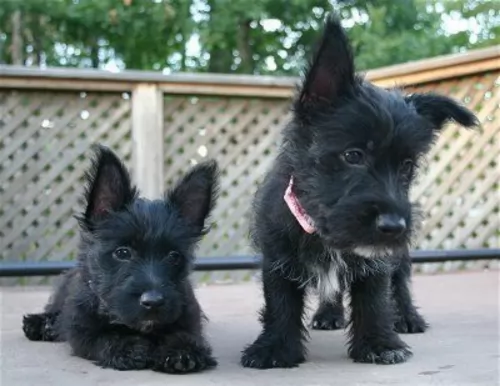 This hybrid dog can inherit any of the issues faced by its two parent breeds. For the Scoland Terrier this can include:
This hybrid dog can inherit any of the issues faced by its two parent breeds. For the Scoland Terrier this can include:
• Seborrhea – Skin disease that can cause dogs to scratch until bleeding and/or infected.
• Carniomandibular Osteopathy -called lion’s jaw this is a developmental disease that causes extensive changes in the bones of the mandible and skull.
• Pulmonic Stenosis – when the blood flowing from the heart’s right ventricul to the pulmonary artery is blocked.
• PPM or Persistent Pupillary Membranes - causes visual impairment when the membranes do not dissolve after birth.
• Chronic Hepatitis – disease of the liver that can eventually cause major damage.
 This is an energetic active dog, or she should be. Feed her high nutritious food twice a day. Do not overfeed.
This is an energetic active dog, or she should be. Feed her high nutritious food twice a day. Do not overfeed.
The most potentially troublesome health issue is Fanconi Syndrome. This kidney disorder can impact the of the body’s absorption of electrolytes, water and nutrients. These nutrients include Sodium, Potassium, Glucose, Phosphate, Amino Acids and Phosphate
The Black Norwegian Elkhound loves to play, and they love to work. Exercise is vital, but it must be one of those two things – play or work. Don’t leave him alone to figure it out for himself or you wont like what this intelligent dog decides to do. She needs a large yard, a long walk daily but jogging with you is even better. Make him heel when on leash or he will think he oversees you. These are roaming dogs who will follow a scent anywhere and ignore your commands for her to come to you. They are better off on a leash unless you are in a dog park or a fenced yard.
The Black Norwegian Elkhound is great at all dog athletics, games and sports such as agility, rally obedience, flyball, tracking, herding.
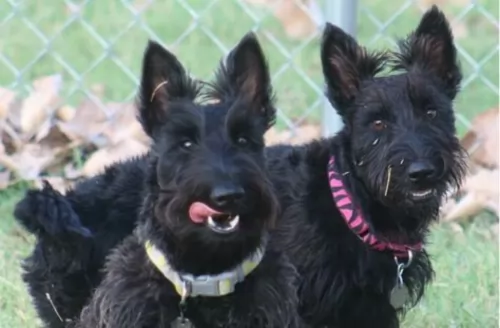 1.Feeding the puppy - Give a high quality puppy dog food designed for terriers or active medium sized dogs. Give ¾ of a cup over 3 meals a day.
1.Feeding the puppy - Give a high quality puppy dog food designed for terriers or active medium sized dogs. Give ¾ of a cup over 3 meals a day.
2.Feeding the adult – Give a high quality adult dog food designed for terriers or active medium sized dogs. Give one cup over two meals a day.
4. Games and Exercises – The Scoland Terrier is a very active dog and needs daily exercise, He need time to play, run, and be stimulated by games. She would be very good at flyball, Frisbee, fetch, agility, barn hunt, and obedience. He needs at least 2 hours of play and exercise everyday.